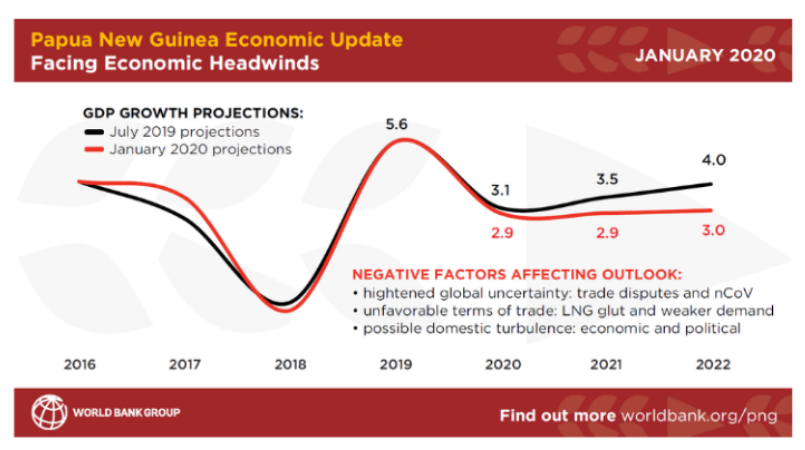
PNG’s gross domestic product (GDP) growth is expected to fall to around 3 percent between 2020 and 2022.
According to the latest World Bank Economic Update, PNG’s growth outlook remains positive, but projected GDP growth rates are lower than their previous forecasts, mainly due to delays in finalising agreements and launching large new resource projects.
The report states that the PNG economy continues to face economic headwinds resulting from global and domestic economic uncertainties.
The World Bank Report titled PNG Economic Update: Facing Economic Headwinds looks at recent key developments in PNG’s economy and places these in a longer-term and global context.
The report states that PNG’s GDP growth surge in 2019 was driven by a rebound in the resources sector of the economy following the February 2018 earthquake, which masked slower growth of the non-resource economy.
This in turn has been reflected in sluggish domestic demand, as confirmed by a shortfall in non-resource tax revenue and lower inflation.
“We expect real GDP to hover around 3 percent a year on average from 2020 to 2022, which is still a positive outcome for this economy, so there will be no contraction expected,” says Ilyas Sarsenov, World Bank Senior Economist for Papua New Guinea.
“However, we also identified downside risks for the outlook. We already mentioned the domestic development in regards to the delay to agreeing and implementing the large resource projects, which are Papua LNG and P’nyang.
“However, we see that the Government is acting in the best interest of its population by delaying this project and trying to reap as much from the projects for the economy and population.”
External risks to PNG’s economy include heightened global uncertainty, including the partial trade deal between the United States and China and the emergence of new risks to Chinese and global growth, including the coronavirus outbreak.
The report also provides an in-depth examination of the relationship between inclusiveness of growth and human capital (the health, knowledge, skills and resilience people accumulate).
The report evaluates the implications of recent trends and policy reforms alongside the government’s stated development objectives, and recommends that increased investment in human capital will be a critical prerequisite to achieving quality and inclusive growth in PNG.
The report stresses that it will be important for the government to make education and healthcare more accessible and affordable and create more opportunities for skills development, particularly among youth.
The Papua New Guinea Economic Update is available to read in full at: www.worldbank.org/en/country/png/publication/papua-new-guinea---facing-economic-headwinds.
